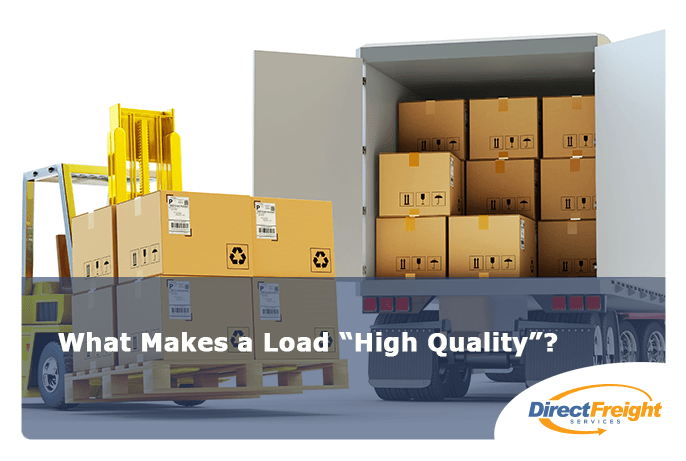Not all loads are profitable. Fuel costs, competition, and freight type can all impact the shipment rate. If you’re not careful, you could end up in the red, the load costing more than it’s bringing in. How do you know? How do you pick a high-quality load that’s going to be the most profitable?
The value of a load is what it pays. However, there’s so much more to take into consideration than how much it’s going to pay. A high-quality load is one that not only pays well but isn’t going to have added costs, added work, or increased risk. By looking at the whole picture, you can better judge the quality of the load before committing to it.
Is a Load High-Quality?
To understand the quality of the load, there are several questions that should be asked.
What is the pay?
Simple and straightforward. Look at how much the load pays per mile.
Does the freight lane make sense for me?
The freight lane is the freight going into and coming out of an area. If it is balanced, it means there is an equal amount of freight going in and coming out. Freight brokers will aim for a balanced freight lane because it means they’ll be able to eliminate deadhead miles and truckers should look at this too.
Is it a good rate for that particular lane?
Remember, if it seems too good to be true, it probably is. Do some comparison shopping.
What is the competition like in this lane?
Load boards can tell you the number of trucks in the area. If there is little competition, you’ll be able to negotiate a better rate.
What are fuel costs?
If fuel costs are high, there’s less profit and you’ll need to demand higher pay.
What is the load weight?
Heavier loads eat up more fuel.
Is there extra work involved?
Sometimes loads require a lot more work than anticipated. Tarping is a good example of this and in fact, it’s a deal-breaker for many truckers. Tarping is when large, heavy tarp must be placed over a load on a flatbed truck. It’s hard work, and it’s dangerous, and most truckers hate doing it. Shippers generally understand this and will add tarp pay so make sure if you take a job that involves tarping that they pay you for the extra work. (Sometimes shipping have machines that tarp the freight on the truck for you. Use it. It’ll make the process much quicker and easier.)
Is the load dangerous?
Even under the best circumstances, some loads are downright dangerous such as steel coils. Steel coils are extremely heavy rolls of steel that are held on a flatbed by chains. Some truckers won’t touch them because of the danger involved with transporting them.
How to Get Higher-Quality Loads
There are some steps that can improve your chances of obtaining higher-quality loads that will bring in higher pay and improve your business.
Know your own operating costs. If you don’t, you could take on a load that will cost you money or one that is worth so little it’s not worth your time. Knowing the minimum amount that you need to make a profit will give you more negotiating power for rates. Walk away from loads that don’t offer enough.
Look at every aspect of the trip. Things like wait-times can eat into a trucker’s profits in a big way. These wait-times usually occur during load pickups and drop-offs. When you’re paid by the mile and you’re not moving, you’re losing money.
Consider government contracts. Sure, it’s hard work to get them and there’s a lot of competition, but they can pay really well.
Get endorsements. Getting specialized training and license endorsements can bring in better loads. Whenever there is special training required, there will be fewer qualified truckers to haul the load. Examples:
- Liquid hauling. Driving reefers, hauling liquids, requires added training and knowledge. If the chemicals are hazardous such as gas or chemicals, a special hazmat certification is required.
- Oversized loads. These loads also have a special license and training as well.
- Driving specialty trucks. Car carriers, dump trucks, mining trucks can all bring in higher pay.
Use a good load board. Load boards can help find quality loads in many ways. They create a more balanced freight lane by cutting down on deadhead miles, find larger, established shippers who pay on time, show you the freight lanes you want to drive, and help you manage your operation. Using a good load board can save a lot of time tracking down loads, making the whole process more efficient. After all, time is money and if you’re getting paid by the mile, you aren’t getting paid for looking for loads.
Direct Freight Services is a web-based load board that allows users to search for loads or post trucks. It has many helpful features like full credit reports, load filtering, payment expectations, and broker authority information. Whether accessed online or now through our easy-to-use Direct Freight app, Direct Freight helps you find the right loads. Go to DirectFreight.com and start searching for those high-quality loads today!

